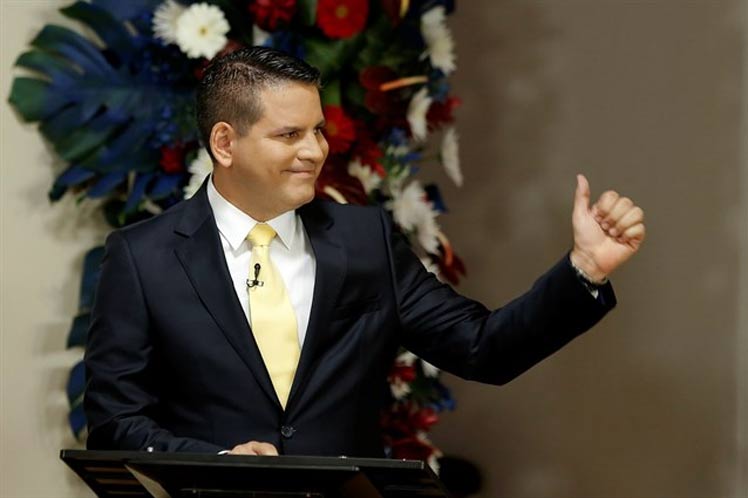
Fabricio Alvarado will dispute the second electoral round, scheduled for April 1, with aspirant for the governing Partido Accion Ciudadana (PAC), Carlos Alvarado
Presidential candidate for Party Restauracion Nacional (PRN), Fabricio Alvarado, won the first round of general elections in Costa Rica, thanks to the support of the more conservative sectors, contrary to legalization of equal-sex marriage, but did not reach the presidency.
In last December’s surveys, the evangelic aspirant did not surpass three percent of vote intention, but a ruling of the Interamerican Court of Human Rights (ICHR) of January 9 in favor of equal-sex marriage deeply set in the Costa Rica election campaign.
The aspirant for the PRN, profited from that decision of the ICHR, of obligatory compliance for Costa Rica, for being signatory of the continental entity, to oppose and even threaten to withdraw the country from the organization to become president, and based his campaign from that moment on in the rejection to equal-sex marriage.
With a constantly repeated phrase of ‘principles and values’ he defended the concept of a traditional family and thus attracted the votes of the more conservative Costa Ricans, which in the surveys of middle and end of January, catapulted him to the first place, with 17 percent support of electors.
In yesterday’s election, Fabricio Alvarado ratified those forecasts and rose to victory in the first round, with 24.79 percent of valid votes emitted, when 89.09 percent of all emitted votes had been counted. However, he could not be proclaimed president as for that, he required 40 percent of the votes.
For surprised analysts and not a few inhabitants of this country, Fabricio Alvarado will dispute the second electoral round, scheduled for April 1, with aspirant for the governing Partido Accion Ciudadana (PAC), Carlos Alvarado, who also showed increasing favoritism of Tico voters.
In previous polls, Carlos Alvarado appeared in a third place with 10.6 percent of vote intention, figure he doubled, because with the same percentage of polling stations counted, he has 21.76 percent of the votes.
But the most outstanding result of Costa Rica general electioons was that for the first time in the political history of this country, both traditional parties. Liberacion Nacional (PLN) and Unidad Social Cristiana (PUSC) were left out of the presidential definition.
Since 1954 and for 60 years after that, the PLN and the PUSC alternated in the presidency of this Central American nation until in 2014, the PAC candidate, Luis Guillermo Solis, defeated in the second round thje aspirant of the PLN, Johnny Araya.
In his speech before his followers, Alvarez recognized the defeat ansd blamed himself for the complete failure of his party in the polls, as from the start of the campaign he was sure of a resounding victory in the first round, taking him to the presidential chair without the need of a second round.
Another curious result of the general elections was that abstentionism marks 34.27 percent, which although high, is less than what was forecast by previous surveys, that put it near 40 percent.
 Escambray ENGLISH EDITION
Escambray ENGLISH EDITION





Escambray reserves the right to publish comments.